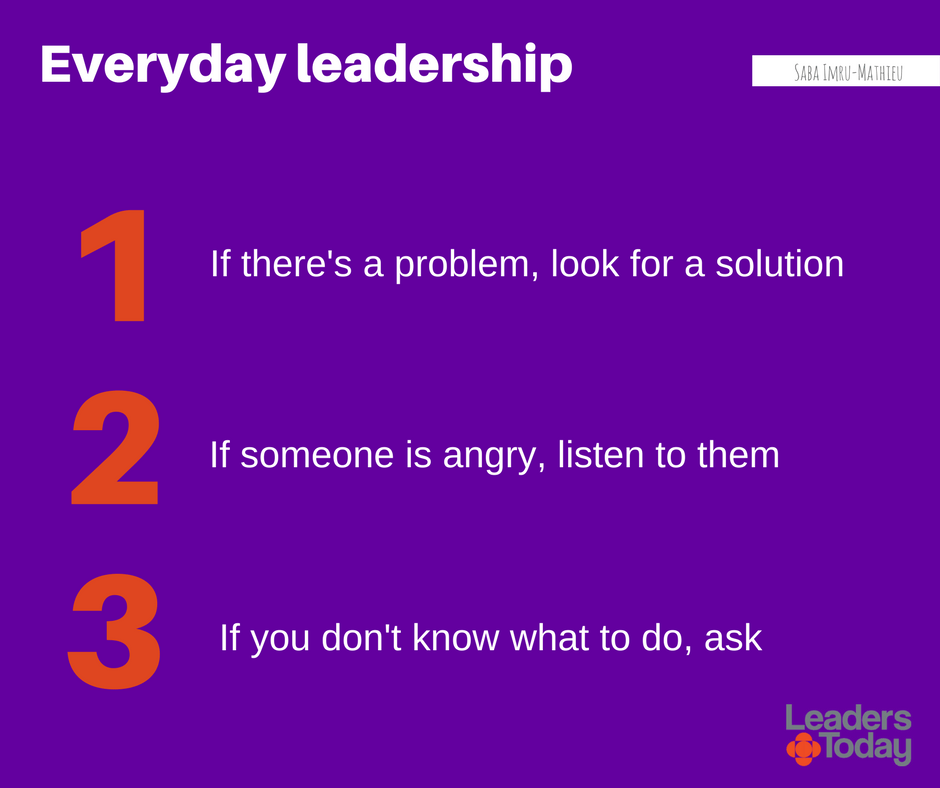3 Leadership behaviours for everyone
Leadership is something we all express in our lives, most often without realizing it
When was the last time you took the initiative to organize an event at work, or for your family? You probably had to harness the help of other people and find creative solutions to any hurdles you faced. Maybe you had to make a risky choice, or calm down an argument or convince someone that it was worthwhile to make an effort. You probably took the time to acknowledge and thank those who helped you. There’s a good chance that you made new friends in the process. These behaviors all derive from your innate leadership capability, and if you cultivate them consciously, you can grow them into a battery of powerful skills with which to advance in life and at work.
Here are three essential leadership skills that we can easily put into practice more deliberately from today.
1. If there’s a problem, look for a solution
Being solution-focused is not something that we automatically turn to. It is very tempting, when facing a problem, to spend an excessive amount of time hand-wringing, analyzing what's going wrong, finding who’s to blame and perhaps wallowing in self-pity. As part of our survival instinct we humans are hard-wired to notice the negative, spot possible dangers, dissect problems and dwell on their consequences.
We know from cognitive psychology that people process negative information more thoroughly and for a longer period than they would positive information. Simply said, a problem is a magnet for our attention. While the negative feelings that emerge from observing a problem may initially provide an impetus to resolve it, the downside is that if we focus too long on the problem, we risk causing a prolonged high stress level within ourselves, which in turn hampers optimal cognitive performance. Yes, we think less clearly when we’re stressed out so it’s not really the best place to be for effective problem-solving.
Expressing leadership when facing a problem requires being decisive. It means analyzing the problem thoroughly but quickly and then mobilizing all our energy to find a solution and move on. There is no shortage of next problems that might come our way in life, so it’s in our interest to develop a strong solution-focus and a grit for problem-solving.
2. If someone is angry, listen to them
An angry person makes us cringe! The first instinct is to get out of their way and if that’s not possible, the second strategy is to try and silence them. But anger doesn’t go away that easily if you try to repress it. Have you ever tried telling an angry person to calm down? It doesn’ t usually go down very well! There’s a reason for this, anger is often a sign that someone has something important (to them anyway) to express. It may be frustration, disappointment, outrage. You might think it is justified or not, but whatever it may be, it reflects that something has not been heard under normal circumstances so now the angry person needs to “shout” it out.
Expressing leadership in such situations implies having a certain degree of self-control to weather the storm. Give a clear signal to the angry person that you are willing to listen to their woes (not forever though!). Once they’ve done some venting, ask them what they would like, how they want the situation to evolve. You’ll be surprised how a bit of good, sincere listening can quell a fury. Sincere, open listening creates the conditions for the angry person to calm down and start thinking about how to move on.
3. If you don’t know what to do, ask
“I don’t know” can be a hard phrase to say. Whether it’s at school or at home and especially in corporate life, where there is a huge pressure on people to unfailingly come up with an answer to everything, finding yourself in situation where you don’t know what to do might feel very uncomfortable. And asking for help or advice might seem even more scary. Many people are reluctant to admit they don’t know something for fear of being seen as incompetent.
But actually, there is great strength (and honesty) in displaying some vulnerability. In the last two decades new leadership models have emerged arguing for more authenticity and higher levels of transparency as essential elements for building the trusting relations that are needed to succeed in any enterprise where more than one person is involved. You’re far better off admitting that you don’t know, rather than pretending that you do because people can tell if you’re uncertain, vacillating or simply waffling about something. It’s a bit like the story of the Emperor’s clothes! Instead, people will respect you deeply if you are candid and humble, and they will trust you all the more for it. Asking for help or advice when you don’t know also makes sense in terms of leveraging the collective intelligence of the people around you which often results in a better solution than you could have come up with on your own.








